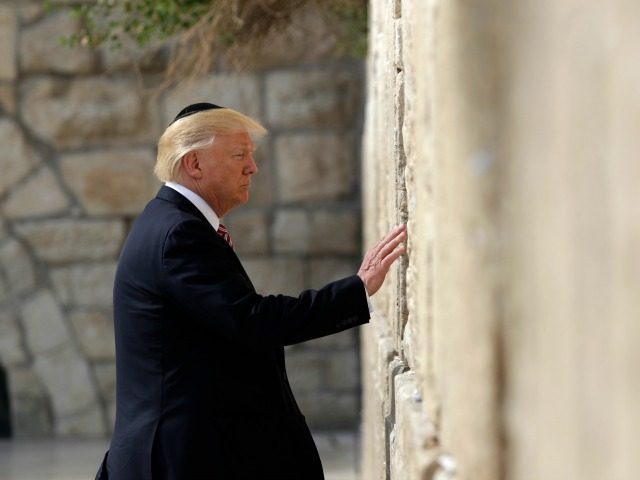Israeli Prime Minister Benjamin Netanyahu has called President Donald Trump “the greatest friend Israel has ever had in the White House.” Indeed, decades of U.S. policy towards Israel has been reversed under Trump.
Ahead of the Republican National Convention — which, in a serendipitous twist, Secretary of State Mike Pompeo will address from Jerusalem — here are 12 pro-Israel policies that have occurred under the Trump administration:
1. Recognizing Jerusalem as the Israeli Capital
In December 2017, Trump formally recognized Jerusalem as the capital of Israel, fulfilling a central campaign promise.
2. U.S. Embassy Transfer
Five months later in May 2018, coinciding with the 70th anniversary of the establishment of the State of Israel, U.S. and Israeli officials inaugurated the relocated U.S. embassy in Jerusalem, fulfilling a promise that was made – but never honored – by successive U.S. administrations since 1995.
3. Cutting Aid to the corrupt U.N.’s Palestinian Refugee Agency
In August 2018, the State Department announced the U.S. was ending all funding to the United Nations Relief and Works Agency (UNRWA), which it called “irredeemably flawed.” The U.S. was the largest single contributor to the U.N. agency, donating some $360 million annually. UNRWA has come under fire on many occasions for spreading antisemitic hate in its schools and employing members of terror organizations and supporters of terror. Senior UNRWA officials were embroiled in scandal, when a leaked internal report charged them with “sexual misconduct, nepotism, retaliation, discrimination and other abuses of authority, for personal gain.”
4. Recognizing Israeli Sovereignty over the Golan Heights
Israel captured the Golan Heights from Syria in the 1967 defensive Six Dar War and annexed the territory in 1981. In March 2019, Trump announced that the U.S. would become the first country outside of Israel to recognize the strategic plateau as Israeli. The move resulted in an Israeli township called Trump Heights named in honor of the American president.
5. U.S. No Longer Deems Settlements Illegal
In November 2019, Secretary of State Mike Pompeo said the U.S. no longer views Israeli settlements as a violation of international law – breaking with decades of U.S. policy.
6. Executive Order Against Antisemitism
In December 2018, Trump signed an executive order for fighting antisemitism, which included prohibiting discrimination within “federally assisted programs” such as college campuses. The order also adopted the International Holocaust Remembrance Alliance’s definition of antisemitism.
7. The Importance of the Comma in Middle East Policy
This one went mostly under the radar. The State Department ceased using the nomenclature “Israel and The Occupied Territories” and instead began referring to the region as “Israel, Golan Heights, West Bank, and Gaza.” Other than shunning the term “Occupied Territories,” (it now recognizes them as “disputed,”) the strategically placed comma after the West Bank and Gaza separates the two areas and thus allows for more than one solution to the conflict. Lumping them as one entity, as was the case before and as is still the case with the E..U and the U.N., does not allow for any distinction between the Palestinian Authority-ruled West Bank, which has officially recognized Israel, and the Gaza Strip, ruled by the Hamas terror group, which does not recognize Israel and has vowed its destruction.
8. Cutting U.S. Aid to the Palestinian Authority over its Pay-for-Slay Scheme
In March 2018, Trump signed the Taylor Force Act, a bill named after former U.S. Army veteran and Vanderbilt University graduate student Taylor Force, who was killed in a stabbing attack while he toured Tel Aviv with his school in March 2016. The legislation saw funds to the Palestinian Authority equal to the amount paid out to terrorists and their families cut. The PA was found to have paid more than $150 million in salaries in the pay-for-slay scheme in 2019.
9. Combating BDS Act
The bill, introduced in January 2019 and passed by the Senate, counters the Boycott, Divestment and Sanctions movement against Israel.
10. Pro-Israel House Resolutions
House Resolution 246 passed by a vote of 398-17 in July 2019, also rejected the BDS movement and called for increased security aid to Israel. Later that year in December, House Resolution 2343 passed unanimously, calling for Palestinian school textbooks to stop “encouraging war and violence, antisemitism, hate and intolerance.”
11. Nixing the Nuclear Deal with Iran
Trump scrapped the Obama-led 2015 nuclear deal in May 2018. Netanyahu has warned against the deal for years, citing the Islamic Republic’s oft-repeated vow to annihilate Israel.
12. Brokering Peace Deals Between Israel and Arab Countries
The Trump administration led the way for Israel to normalize relations with the United Arab Emirates, marking the third Arab country to hold diplomatic ties with the Jewish state after Egypt and Jordan. Trump has said that more countries are on the way and on Sunday, reports emerged that two more Arab countries were likely to ink deals with Israel in the next two weeks.
Deborah Danan is an Israel-based correspondent for Breitbart News.

COMMENTS
Please let us know if you're having issues with commenting.